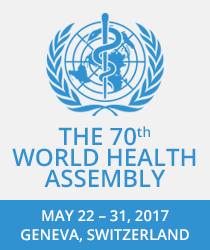‘I envision a world in which everyone can lead healthy and productive lives, regardless of who they are or where they live. I believe the global commitment to sustainable development – enshrined in the Sustainable Development Goals – offers a unique opportunity to address the social, economic and political determinants of health and improve the health and wellbeing of people everywhere’
Tedros Adhanom Ghebreyesus WHO’s Director General

by Daniele Dionisio
Membro, European Parliament Working Group on Innovation, Access to Medicines and Poverty-Related Diseases
Responsabile Progetto Policies for Equitable Access to Health – PEAH
70ma Assemblea Mondiale OMS Risoluzioni Principali

Dal 22 al 31 maggio scorso Ginevra ha ospitato i lavori della 70ma Assemblea Mondiale OMS. Fervido di dibattito e di partecipazione, l’evento si è concluso con diverse risoluzioni adottate dagli stati membri, tra cui quella inerente la diagnosi, la terapia e la prevenzione delle malattie cancerose. Al riguardo, i governi sono stati chiamati all’implementazione dei programmi nazionali di prevenzione e controllo oncologico, oltre alla promozione di ricerca sul campo per cure basate sull’equità di accesso, mentre all’OMS è stata richiesta fattiva collaborazione con attori esterni per lo sviluppo di nuovi presidi farmacologici efficaci e alla portata di tutti.
Tra le altre risoluzioni adottate, è da menzionare quella relativa all’impegno dei governi per l’integrazione, la prevenzione e l’assistenza per la sordità e la perdita dell’udito.
L’Assemblea ha inoltre eletto il nuovo Direttore Generale OMS nella persona del Dr. Tedros Adhanom Ghebreyesus, già ministro della salute e degli affari esteri in Etiopia.
Di seguito una selezione delle restanti decisioni assunte dall’Assemblea:
- Incremento del 3% delle contribuzioni all’OMS da parte degli stati membri
Come effetto, il budget programmatico dell’Agenzia per il biennio 2018-2019 è salito a 4.421,5 milioni di dollari (inclusivi di 28 milioni di dollari corrispondenti al suddetto 3%). in linea con gli Obiettivi di Sviluppo Sostenibile (SDGs), ciò consentirà maggiori investimenti per il nuovo ‘Health Emergencies Programme’ di OMS (69,1 milioni di dollari) e per la lotta contro la resistenza microbica agli antibiotici (23,2 milioni di dollari).
Sebbene sensibilmente inferiore al 10% di incremento sperato dall’Agenzia, il compromesso ha comunque consentito ad OMS prospettive di maggiore operatività ed autonomia (con augurabile parziale svincolo dai condizionamenti imposti dai donatori privati). Sarà compito del Direttore Generale vigilare sulla continuità dei finanziamenti pubblici nel prossimo biennio.
- Nuova agenda programmatica per l’ufficio regionale OMS per l’Africa
I nuovi programmi, volti alla soluzione di problematiche tuttora endemiche in molti Paesi del continente, includeranno particolare attenzione alla salute adolescenziale e alla realizzazione di efficaci piani di approccio alle emergenze sanitarie.
Contestualmente, l’OMS aiuterà I Paesi nello sviluppo di strategie e soluzioni basate sull’evidenza per le tossicodipendenze, i disturbi mentali, le necessità di immunizzazione, e i servizi per la salute riproduttiva e sessuale nell’ambito dei programmi mirati agli adolescenti. L’Agenzia aprirà nel 2018-2019 centri qualificati per la formazione delle comunità in tema di emergenze sanitarie.
Le attività menzionate includeranno pragmatici indicatori di performance in ordine all’ appropriatezza e all’efficacia gestionale dei singoli programmi.
- Implementazione dei piani di azione contro la resistenza microbica
Preso atto dei progressi, i delegati hanno condiviso la necessità che gli sforzi comprendano, oltre allo sviluppo di nuovi antibiotici, migliori capacità diagnostiche e di prevenzione, e il rafforzamento dei sistemi sanitari. Contestualmente, è stata adottata una risoluzione per il controllo della sepsi, quale condizione a rischio vita di solito determinata da infezioni batteriche. La risoluzione richiede ad OMS di esercitare azione guida sulla prevenzione e gestione degli eventi settici, e di supportare i Paesi nell’acquisizione e consolidamento di capacità, strategie e mezzi idonei alla riduzione dei casi di sepsi. OMS dovrà collaborare con le altre Agenzie delle Nazioni Unite anche al fine di realizzare terapie sicure e di qualità e renderle equamente fruibili da tutti.
Questa tematica è stata oggetto di forti contrasti per il desiderio di alcuni stati membri (es. India) che fosse inserito nell’agenda assembleare il report finale dell’UN High Level Panel on Access to Medicines del settembre 2016, nonostante l’ostilità di altri (es. USA, Regno Unito, Giappone). Alla fine l’Assemblea ha posposto la tematica all’ordine del giorno dell’ OMS Executive Board Meeting del prossimo gennaio 2018.
- Collaborazione OMS/ILO/OECD
Gli stati membri hanno aderito a un piano quinquennale di collaborazione fra OMS, International Labor Organization (ILO) e Organization for Economic Cooperation and Development (OECD) per migliorare il divario fra la realtà presente e le attese circa la forza lavoro necessaria per la salute pubblica, specialmente nei Paesi a risorse limitate. Se le risorse umane sono indispensabili per gli SDGs correlati alla salute, difficilmente essi saranno conseguiti con l’attuale deficit di 17 milioni di operatori sanitari globali (medici, infermieri e ostetriche inclusi).
Preso atto che la sfida consiste nel come eradicare gli ultimi casi di polio pianificando nel contempo l’abbandono di programmi esclusivamente centrati sulla malattia, un ‘polio transition planning document’ è stato rilasciato da OMS durante i lavori assembleari. Il documento illustra potenziali rischi – finanziari, programmatici e di staff – connessi all’accantonamento della propria ‘Global Polio Eradication Initiative’ (GPEI). GPEI è infatti così embricata con altri programmi vaccinali (ma pure di sorveglianza e di ‘laboratory funding’) da prevedersi, in caso di dismissione, pesanti battute d’arresto in campagne vaccinali per morbillo, rosolia, difterite, tetano e pertosse, che sono essenziali nei Paesi in transizione dalla polio. L’Africa ne sarebbe particolarmente colpita poiché il 90 percento circa delle infrastrutture e staff dedicati alle vaccinazioni è finanziato tramite GPEI.
PER APPROFONDIRE
8 takeaways from the 70h World Health Assembly https://www.devex.com/news/8-takeaways-from-the-70th-world-health-assembly-90362
The next WHO director-general is Tedros Adhanom Ghebreyesus https://www.devex.com/news/the-next-who-director-general-is-tedros-adhanom-ghebreyesus-90330
Nuovi Obiettivi di Sviluppo Sostenibile: Zoppi senza Radicali Svolte di ‘Governance’ http://www.peah.it/2015/10/nuovi-obiettivi-di-sviluppo-sostenibile-zoppi-senza-radicali-svolte-di-governance/
Tedros’ fundraising strategy for WHO, global health https://www.devex.com/news/tedros-fundraising-strategy-for-who-global-health-90364
WHO: polio transition planning http://apps.who.int/gb/ebwha/pdf_files/WHA70/A70_14Add1-en.pdf
Global polio eradication initiative http://polioeradication.org/
THE UNITED NATIONS SECRETARY-GENERAL’S HIGH-LEVEL PANEL ON ACCESS TO MEDICINES REPORT: final report http://www.unsgaccessmeds.org/final-report/
Antibiotico-resistenza: l’impegno di OMS http://www.toscanamedica.org/95-toscana-medica/politiche-per-l-equo-accesso-alla-salute/491-antibiotico-resistenza-l-impegno-dell-oms






